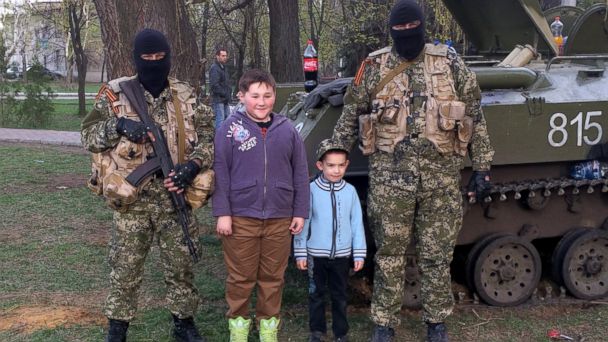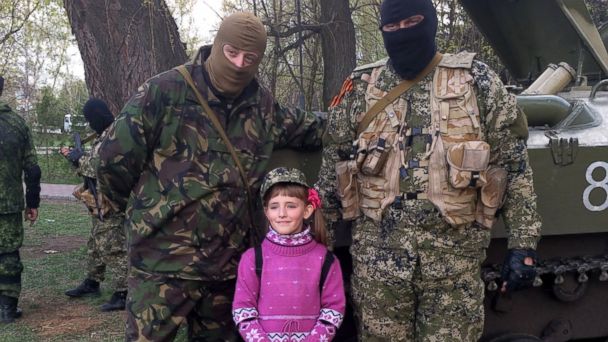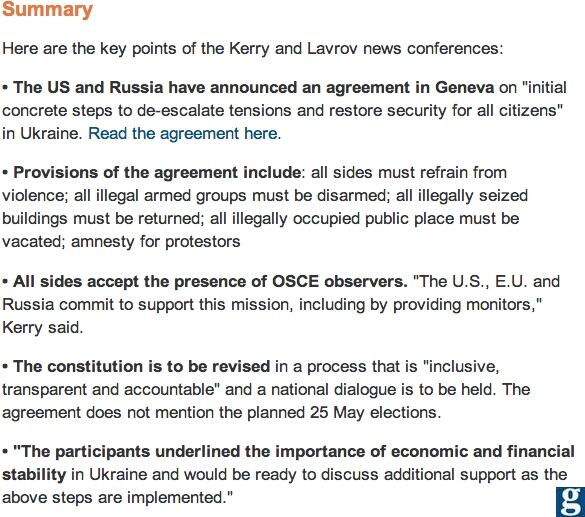The grandmasters in the Kremlin must be delirious with laughter! Which wag was it on BRF who advocated sending in a trainload of vodka? Pres.Putin should reward him with "bottle honours" and a case of the very best of Stoli!
"Ukraine humiliated..." says Britain's Torygraph.
Chaos, confusion and itchy trigger fingers reign as Kiev begins its ‘anti-terrorist’ mission ..says the Independent
Kiev's grip on eastern Ukraine weakens as pro-Russians seize army vehicles
What was meant to be a show of strength by Ukraine's army has instead shown how the country is unravelling
http://www.theguardian.com/world/2014/a ... y-vehicles
Luke Harding in Slavyansk
The Guardian, Wednesday 16 April 2014
For Kiev's beleaguered army it was meant to be a display of strength. Early on Wednesday a column of six armoured personnel carriers trundled through the town of Kramatorsk, in eastern Ukraine. Some 24 hours earlier Ukrainian soldiers had recaptured a small disused aerodrome. Their next target appeared to be Slavyansk, the neighbouring town, occupied by a shadowy Russian militia. Was victory close?
The column didn't get far. At Kramatorsk's railway junction, next to an open-air market and a shop selling building materials, an angry crowd caught up with it. Next armed separatists dressed in military fatigues turned up too. Within minutes the Ukrainian soldiers gave up. Without a shot being fired they abandoned their vehicles. The pro-Russian gunmen grabbed them. They raised a Russian tricolour. They sat on top and went for a victory spin.
In theory this was happening in Ukraine, under the control of a pro-western government in Kiev, and several hundred kilometres from the Russian border. In reality large chunks of the east of the country are now in open revolt. Ukraine is rapidly vanishing as a sovereign state. Its army is falling apart. What happens next is unclear. But the Kremlin can either annexe the east, as it did Crimea, again shrugging off western outrage. Or it can pull the strings of a new post-Kiev puppet entity.
The militia who captured the armoured vehicles on Wednesday looked like professionals. They had Kalashnikovs, flak jackets, ammunition. One even carried a tube-shaped green grenade-launcher. Some hid their faces under black balaclavas. Others waved and smiled. All wore an orange and black ribbon – originally a symbol of the Soviet victory over fascism, and now the colours of the east's snowballing anti-Kiev movement. There was a flag of Donbass, the Russian-speaking eastern region with its main city of Donetsk.
After posing for photos, this new anti-Kiev army set off. The armoured personnel carriers (APCs) rattled past Kramatorsk's train station and turned right over a steep dusty bridge. There was a cloud of diesel smoke. Amazed locals jogged alongside then piled into battered mini-buses to keep up. White tread tracks on the tarmac pointed the way. The column covered about six miles (10km) before turning left at the entrance to Slavyansk. It then drove serenely into town and parked round the back of the city hall. Soldiers got off and stretched their legs next to the White Nights cafe.
Slavyansk residents who had been fearing an imminent attack from Ukrainian forces had a moment of cognitive dissonance. Armed pro-Russian gunmen seized control of the city administration on Saturday. Ever since, Ukrainian helicopters and planes had buzzed ominously overhead.
Armed men wearing military fatigues gather by APCs as they stand guard in Slavyansk, Ukraine. Militia gather by seized APCs as they stand guard in Slavyansk, Ukraine. Photograph: Genya Savilov/AFP/Getty Images
"I heard the sound of tanks approaching. I thought that Ukrainian troops had arrived," Vladimir Ivanovich admitted, gazing at the APCs now stationed opposite a small park and children's playground. "I was wrong." So who exactly were the soldiers in masks? "I don't know," he said.
He added: "I'm not a radical or a separatist. I'm actually more on the left. I didn't much like Viktor Yanukovych. I'm for peaceful coexistence. The problem is that when the nationalists seized power in Kiev they didn't think about the consequences. I have my own prognosis about what will happen next. It's not comforting."
The armed men, meanwhile, made little secret of the fact they took orders from Moscow. Many of them appeared to be Russian troops from Crimea. Asked where he had come from, one told the Guardian: "Simferopol." How were things in Crimea? "Zamechatelna," he said in Russian – splendid. He added: "The old ladies are happy. Because of Russia their pensions have doubled." Had he served in the Ukrainian army and perhaps swapped sides? "No, I'm Russian," he replied.
Within minutes, the captured APCs had become the town's newest, most extraordinary tourist attraction. Teenage girls posed coquettishly with the men in balaclavas. Small children lined up too. Someone put a cuddly toy next to a gun barrel. "We were very afraid. Now we are reassured. The tanks are here to protect us," Olga Yuriyevna said. She added: "I'm Russian-speaking. We have relatives in Russia. My husband fought in the Afghan war."
Some people, though, were lacking in enthusiasm. Outside the town hall one pensioner, Alexander Ivanovich, said: "I'm Ukrainian. This should be Ukrainian territory." Gesturing at the faceless gunmen outside the entrance, he said: "I'm suspicious of them." The soldiers had piled sandbags in front of windows, and created sniper positions on the roof. They had also, apparently, ripped down the building's blue-and-yellow trident, a symbol of Ukrainian statehood. A Russian and Donetsk republic flag flew from the roof. The impression was one of calm and vertical order.
On Wednesday afternoon Ukrainian soldiers were led out of the building and packed on to buses. The Ukrainians had surrendered when crowds surrounded their tanks. They were missing their weapons, now confiscated. The 40 or so demoralised troops headed out of town in a westerly direction.
At first the authorities in Kiev refused to believe they had lost the army vehicles. The defence ministry initially dismissed news reports as fake. Later it admitted the disaster was true. As well as APCs, Ukraine has lost control of another crucial weapon in its losing battle with the Russian Federation: television. On Tuesday the Donetsk prosecutor turned Russian state TV back on again, weeks after Kiev pulled the broadcasts on the grounds they sowed lies and Kremlin propaganda. Since President Viktor Yanukovych fled in February Russian channels have consistently called Kiev's new rulers "fascists".
Outside Kramatorsk's aerodrome, meanwhile, at the end of a rustic rutted alley lined with sycamores and apricots, protesters had set up a new camp. It boasted a parasol, a table decked out with sandwiches, and a clump of empty beer bottles. On Tuesday Ukrainian forces had opened fire, lightly wounding two anti-government demonstrators who surged at them across a field. On Wednesday Ukrainian troops were holed up inside. They showed little enthusiasm for venturing out. A felled tree blocked their route.
"We're Russians. We live on Russian soil. So how can we be separatists?" Sergei Sevenko, a 52-year-old car mechanic, wanted to know. A handful of female volunteers stood with him; they had kept vigil until 1am. Sevenko added: "I've lived all my life in Kramatorsk. The economic situation here is horrible. We're just defending our town and our property from fascists." Waiting to interview him was a young female journalist from Moscow. She was holding a microphone decorated with the logo of Lifenews.ru, the Kremlin's favourite website.
By late afternoon another stand-off was developing between a second Ukrainian armoured column in Pcholkino, near Kramatorsk, and an excitable, hostile crowd. Helicopters dipped low over shabby Khrushchev-era blocks of flats to see what was going on, then scouted along the line of the railway. Close to where the column was stuck, locals were building a checkpoint. "The helicopters keep us awake at night. We can't sleep," one complained. A van pulled up. It disgorged black tyres. A man wearing shorts and sunglasses, possibly drunk, began erratically directing traffic.
This febrile anti-Kiev mood has acquired a momentum that increasingly seems unstoppable. A vocal section of the population appears to support the protesters' key demand for a referendum on Ukraine's federalisation. A "people's governor" has been appointed – though it is not clear by whom. Many local politicians, the security services in key eastern towns and the police appear to have gone over to the anti-government side. Kiev's powerlessness in this fast-moving drama seems absolute.
On Wednesday another gang of armed youths seized control of the city hall in Donetsk. Other pro-Russian activists have occupied Donetsk's regional administration building since 6 April. (They have fortified it with a thicket of tyres. On one wall someone had scrawled in Cyrillic script: "F*ck America".) Youths lounged in the entrance lobby and ground floor of the city building. They wore white-and-red armbands bearing the name of a murky sporting organisation and fight-club, Oplot. In Kharkiv, Ukraine's other major eastern city, Oplot has been closely linked with pro-Kremlin groups. And with organised crime.
One Oplot member, Alexander, showed off his weapon. It was a US-made Remington 870 Express Magnum. "It's a hunting gun," he said. "It's my own. I've got a licence for it." Alexander said he had purchased his uniform himself: a light-coloured khaki top and trousers, a flat jacket, and a matching hat. He added: "I'm against America. But I have to say they make good guns."
*We now have a new "Donetsk People's Republic" in the east and not too far away in Moldova,the Transnistriya enclave is calling upon Moscow to recognise its own little republic!
To Russia with love? Transnistria, a territory caught in a time warp
By Karl Penhaul, CNN
April 11, 2014 --
Tiraspol, Transnistria (CNN) -- The previous night we'd been turned away by stern-looking border guards. A categorical "no entry" to Transnistria.
Trans-where?
Transnistria is a breakaway state, recognized by no sovereign nation. It's a sliver of land sandwiched between Moldova and Ukraine and only a little larger than Rhode Island, the smallest state in the United States.
"You can't come in. Right now there is no permission for foreigners and no permission for journalists," said the Transnistrian border guard, clad in an oversized peaked cap with Soviet-style hat-badge.
It was past midnight and we were too tired to argue. To be honest, we had expected as much.
A week earlier, Transnistrian authorities had fast-tracked our request for a journalist visa to report inside their territory.
Transnistria: A land in limbo Transnistria: A land in limbo
Instead of waiting the normal 10 days' processing time, officials had responded within 36 hours. It was a speedy "no."
Transnistria split from the former Soviet republic of Moldova following a two-year war (1990-1992) that erupted as the Soviet Union collapsed. The Russians stepped in to back Transnistria -- located on the right bank of the River Dniestr -- but never recognized it as an independent state.
It became a land in limbo.
More than a decade later, and after Russian troops marched into Ukraine's Crimea region, NATO's top military commander Gen. Philip Breedlove warned Moscow may be eyeing other targets.
Western intelligence has shown tens of thousands more Russian troops massed on Ukraine's eastern border.
Breedlove suggested the force -- backed by tanks and attack helicopters -- was large enough to roll right through Ukraine from east to west and into Transnistria.
The general described this as one of Russia's "frozen conflicts" -- an unresolved political and territorial dispute -- which Moscow could reignite at any time in a bid to expand its influence across the region.
Like the generals in Moscow and Washington, we pored over our map, tracking backroads and alternate routes into the self-declared country.
We decided to try to visit as tourists; our target was the "Equator" a top nightclub in the Transnistrian border town of Bender.
Attempting our approach this time from Moldova, we sloshed a half bottle of local brandy on the floor of our minivan to give it a party smell.
Maybe they got bored of our incoherent fast-talk or perhaps bought the idea that Transnistrian nightlife was a big draw for international partygoers. After a long wait, we were waved through.
As we rolled past decaying heavy industry and tumbledown Soviet-era apartment blocks, it was clear Transnistria needed more than a fancy nightclub to give it a touch of glamor.
At the doors of the "Equator", we were informed that the night's planned event was body painting and a contest to win free cocktails. The rules did not seem entirely clear.
We headed instead for an early night in the capital Tiraspol.
My last foray into cocktail drinking in former Soviet states had ended badly.
A week earlier, up on the Ukraine's northeast frontier with Russia, a Ukrainian tank commander had cracked open a jar of pickled tomatoes, offered up some raw eggs and uncorked home-made vodka.
When the fruit vodka ran out -- we ended the chilly night, in a foxhole, drinking shots of a cloudy liquid from a plastic bottle.
Before he passed out, the gunner explained it was the cleaning fluid for the tank's electronics.
No desire to repeat that in Transnistria.
As we headed early Sunday into downtown Tiraspol, it was easy to see Transnistria is a place trapped in time.
The hammer and sickle is still proudly emblazoned on the Transnistrian flag. A Soviet star is perched atop the city council building and a few blocks down, a towering statue of Lenin rises like a guardian angel.
The roads are named after revolutionary icons: Marx, Engels, Lenin. There's also just plain "Communist Street."
At a flea market, old men traded Soviet army cap badges and shoulder flashes. Many here still hanker after the glory days of the Cold War.
"Of course it was good with the Soviet Union. We wanted to be with Russia and still want to be with Russia," one elderly lady told me. She wrapped her arms around herself as she explained how she had felt protected by the old U.S.S.R.
Viktor, one of the men selling old Soviet military mementos added: "It was good in those days but we know we cannot turn back time. But we want to join Russia now and set up a free-trade zone."
"We don't want to be part of Moldova. They only grab money for their own pockets," he added.
Talking to people here, it's hard to fathom why NATO chiefs would warn of an impending Russian invasion of Transnistria. The doors seem to be wide open and the welcome mat is out.
"Let them come. Here people are all for it. If the Russian military comes everybody will shout 'hooray,'" a chatty blonde woman said.
Transnistrians have repeatedly called to be allowed to join the Russian Federation.
Moscow has so far failed to recognize Transnistria's independence -- insisting that it should first resolve its dispute with Moldova.
After its annexation of Crimea, some political and military analysts believe Russia may be readying to redraw some of Eastern Europe's borders without further consultation.
Away from the flea market, stands "La Dolce Vita," an Italian-style pavement café that serves only instant coffee and dozens of varieties of sugary cakes.
Law student Katya and boyfriend Sergey, an IT student, were consumed in a very public show of affection. Their minds were more focused on love not war. But they paused briefly for questions.
"If the Russians come in it wouldn't be a tragedy at all. The Russian military is already here," Sergey said. The couple added that they intended to go to Russia once they'd graduated to look for well-paid work there. They said good jobs were hard to find in Transnistria.
When the Soviet star waned, a new star rose over Transnistria -- that of Wild West economics.
An ex-KGB agent and former president appears to be one of the biggest businessmen in town. He goes under the brand name "Sheriff" and has a chain of supermarkets, gas stations and even Tiraspol's top soccer club.
Other businesses here may not be so mainstream. International economists often describe Transnistria as a state whose fortunes are built on smuggling booze and tobacco and selling old Soviet weapons.
Out in the countryside, Anna Ivanna has no head for shady dealings. I find her hoeing weeds from her small vineyard. She says her land is perfect for growing organic grapes. Some of it goes to produce Kvint -- a Transnistrian cognac.
She believes becoming part of Russia would bring greater economic benefits like cheaper energy, especially Russian natural gas for heating her home and powering local industry. She's also heard Russian pensions are four times higher than in Transnistria.
"Why do we need Europe? It's good for us to be part of Russia. Maybe Europe is OK for the young people," she said.
Russian soldiers never left Transnistria, after its 1990-1992 independence war with Moldova.
A contingent of around 1,200 occupies bases and highway checkpoints here -- another indication Russian President Vladimir Putin would not need to invade since his troops are already here.
On the outskirts of the capital, we venture into another Soviet-era apartment complex.
On a wall, there's a starkly poetic line of graffiti scrawled in English. It could be the lament of star-crossed lovers or perhaps a sign of the political times.
"I love you. But why I love you?...I never know."
A message from Transnistria. To Russia with love.
PS:Should Surrender Singh move to Transnistria? He too is equally poetic!



